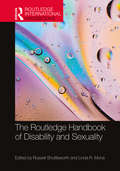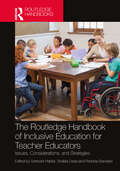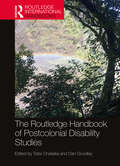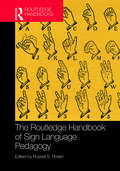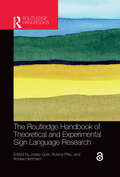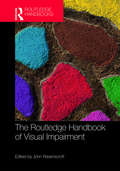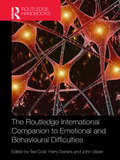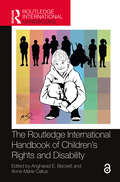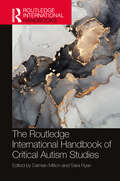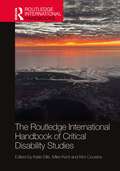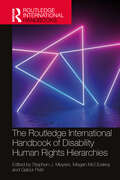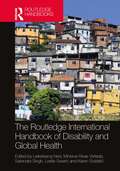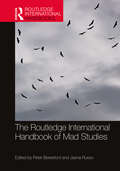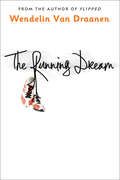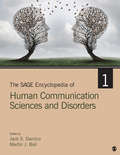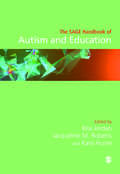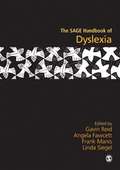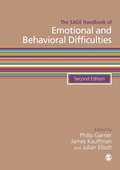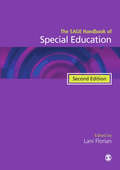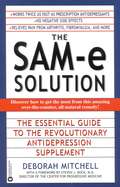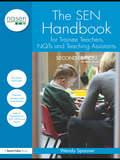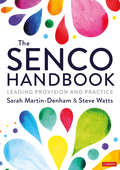- Table View
- List View
The Routledge Handbook of Disability and Sexuality (Routledge International Handbooks)
by Russell Shuttleworth and Linda R. MonaThis handbook provides a much-needed holistic overview of disability and sexuality research and scholarship. With authors from a wide range of disciplines and representing a diversity of nationalities, it provides a multi-perspectival view that fully captures the diversity of issues and outlooks. Organised into six parts, the contributors explore long-standing issues such as the psychological, interpersonal, social, political and cultural barriers to sexual access that disabled people face and their struggle for sexual rights and participation. The volume also engages issues that have been on the periphery of the discourse, such as sexual accommodations and support aimed at facilitating disabled people's sexual well-being; the socio-sexual tensions confronting disabled people with intersecting stigmatised identities such as LGBTBI or asexual; and the sexual concerns of disabled people in the Global South. It interrogates disability and sexuality from diverse perspectives, from more traditional psychological and sociological models, to various subversive and post-theoretical perspectives and queer theory. This handbook examines the cutting-edge, and sometimes ethically contentious, concerns that have been repressed in the field. With current, international and comprehensive content, this book is essential reading for students, academics and researchers in the areas of disability, gender and sexuality, as well as applied disciplines such as healthcare practitioners, counsellors, psychology trainees and social workers.
The Routledge Handbook of Inclusive Education for Teacher Educators: Issues, Considerations, and Strategies
by Santoshi Halder, Shakila Dada and Rashida BanerjeeThis handbook provides foundational, conceptual, and practical knowledge and understanding of inclusive education and special needs education. It highlights the need for preparing special educators and teachers for inclusive classrooms to effectively cater to the needs of students with diverse needs in various low-, middle-, and high-income countries globally. It demonstrates various evidence-based and practice-based strategies required to create classrooms inclusive of diverse learners. While tracing the historical trajectory of the foundational underpinnings, philosophical bases, and crucial issues associated with inclusive education, this book presents a future roadmap and pathways through case instances and in-depth discussions to share with educators how they can strengthen their bases and make learning more inclusive in their context. It also provides an overview of the different models of assessment and their applications in the analysis of children in inclusive classroom settings. Comprehensive, accessible, and nuanced, this handbook will be of immense interest and benefit to teachers, educators, special educators, students, scholars, and researchers in the areas of social inclusion, education, special needs education, educational psychology, technology for inclusion, disability studies, among other related disciplines. It will be extremely beneficial for academicians, teacher educators, special educators, and those interested in professional teacher training courses.
The Routledge Handbook of Postcolonial Disability Studies (Routledge International Handbooks)
by Dan Goodley Tsitsi ChataikaThis book centres and explores postcolonial theory, which looks at issues of power, economics, politics, religion and culture and how these elements work in relation to colonial supremacy. It argues that disability is a constitutive material presence in many postcolonial societies and that progressive disability politics arise from postcolonial concerns. By drawing these two subjects together, this handbook challenges oppression, voicelessness, stereotyping, undermining, neo-colonisation and postcolonisation and bridges binary debate between global North and the global South.The book is divided into eight sectionsi Setting the Sceneii Decolonising Disability Studiesiii Postcolonial Theory, Inclusive Developmentiv Postcolonial Disability Studies and Disability Activismv Postcolonial Disability and Childhood Studiesvi Postcolonial Disability Studies and Educationvii Postcolonial Disability Studies, Gender, Race and Religionviii ConclusionAnd comprised of 27 newly written chapters, this book leads with postcolonial perspectives – closely followed by an engagement with critical disability studies – with the explicit aim of foregrounding these contributions; pulling them in from the edges of empirical and theoretical work where they often reside in mainstream academic literature.The book will be of interest to all scholars and students of disability studies and postcolonial studies as well as those working in sociology, literature and development studies.
The Routledge Handbook of Sign Language Pedagogy (Routledge Language Handbooks)
by Russell S. RosenThe Routledge Handbook of Sign Language Pedagogy is the first reference of its kind, presenting contributions from leading experts in the field of sign language pedagogy. The Handbook fills a significant gap in the growing field of sign language pedagogy, compiling all essential aspects of current trends and empirical research in teaching, curricular design, and assessment in one volume. Each chapter includes historical perspectives, core issues, research approaches, key findings, pedagogical implications, future research direction, and additional references. The Routledge Handbook of Sign Language Pedagogy is an essential reference for sign language teachers, practitioners, and researchers in applied sign linguistics and first, second, and additional language learning.
The Routledge Handbook of Theoretical and Experimental Sign Language Research (Routledge Handbooks in Linguistics)
by Josep QuerThe Routledge Handbook of Theoretical and Experimental Sign Language Research bridges the divide between theoretical and experimental approaches to provide an up-to-date survey of key topics in sign language research. With 29 chapters written by leading and emerging scholars from around the world, this Handbook covers the following key areas: On the theoretical side, all crucial aspects of sign language grammar studied within formal frameworks such as Generative Grammar; On the experimental side, theoretical accounts are supplemented by experimental evidence gained in psycho- and neurolinguistic studies; On the descriptive side, the main phenomena addressed in the reviewed scholarship are summarized in a way that is accessible to readers without previous knowledge of sign languages. Each chapter features an introduction, an overview of existing research, and a critical assessment of hypotheses and findings. The Routledge Handbook of Theoretical and Experimental Sign Language Research is key reading for all advanced students and researchers working at the intersection of sign language research, linguistics, psycholinguistics, and neurolinguistics.
The Routledge Handbook of Visual Impairment: Social and Cultural Research (Routledge International Handbooks)
by John RavenscroftThe Routledge Handbook of Visual Impairment examines current debates as well as cross-examining traditionally held beliefs around visual impairment. It provides a bridge between medical practice and social and cultural research drawing on authentic investigations. It is the intention of this Handbook to provide an opportunity to engage with academic researchers who wish to ensure a coherent and rigorous approach to research construction and reflection on visual impairment that is in collaboration with, but sometimes is beyond, the medical realm. This Handbook is divided into ten thematic areas in order to represent the wide range of debates and concepts within visual impairment. The ten themes include: cerebral visual impairment; education; sport and physical exercise; assistive technology; understanding the cultural aesthetics; socio-emotional and sexual aspects of visual impairment; orientation, mobility, habitation, and rehabilitation; recent advances in "eye" research and sensory substitution devices; ageing and adulthood. The 27 chapters that explore the social and cultural aspects of visual impairment can be taken and used in a variety of different ways in order to promote research and generate debate among practitioners and scholars who wish to use this resource to inform their practice in supporting and developing positive outcomes for all.
The Routledge International Companion to Emotional and Behavioural Difficulties
by Harry Daniels Ted Cole John VisserResponding to disruptive or troubled pupils with emotional and behavioural difficulties (EBD) remains a highly topical issue. The challenges these children present relate to wider issues of continuing political concern: the perceived declining discipline in schools; school and social exclusion; the limits to inclusion for children with special needs; increasing mental health difficulties in children; youth crime and parenting skills. It’s little wonder that the 'EBD' (often known as ‘BESD’ or ‘SEBD’) category is one of the most common forms of SEN around the world. This topical and exhaustively-researched Companion examines the difficulties of defining EBD, and the dangers of allocating this imprecise label to children. Bringing together the work of contributors from fifteen countries and across four continents, this book features the research of leading experts in the global field of EBD, who discuss and debate educators’ key concerns by: looking at the overlaps between EBD, ADHD and mental health difficulties; outlining the types of appropriate schooling for children with EBD; urging readers to look beyond pupils’ challenging behaviour in order to understand and respond to the social, biological and psychological causation; considering the key areas of assessment, whole-school and targeted approaches that help pupils with EBD in mainstream and in special settings; outlining helpful work with families, the crucial contribution of effective multi-agency working and the importance of supporting and developing teachers who work with challenging pupils. Containing contrasting views on controversial topics, this Companion’s approachable style makes it an essential reference book for academics, policy makers, practitioners, educators and students who are working towards a higher degree in education.
The Routledge International Handbook of Children's Rights and Disability (Routledge International Handbooks)
by Angharad E. Beckett Anne-Marie CallusThis handbook provides authoritative and cutting-edge analyses of various aspects of the rights and lives of disabled children around the world. Taking the UN Convention on the Rights of Persons with Disabilities (CRPD) and the UN Convention of the Rights of the Child (CRC) as conceptual frameworks, this work appraises the current state of affairs concerning the rights of disabled children across different stages of childhood, different life domains, and different socio-cultural contexts. The book is divided into four sections: Legislation and Policy Children’s Voice The Life Course in Childhood Life Domains in Childhood Comprised of 37 newly commissioned chapters featuring analyses of UN documents and case studies from Australia, Brazil, Ethiopia, Hong Kong, Italy, the Netherlands, Norway, Papua New Guinea, Serbia, South Africa, Spain, Sweden, the United Kingdom, the United States, and Vanuatu, its multidisciplinary approach reflects the complexities of the lives of disabled children and the multifarious nature of the strategies needed to ensure their rights are upheld. It will be of interest to researchers and students working in disability studies, education, allied health, law, philosophy, play studies, social policy, and the sociology of childhood. It will also be a valuable resource for professionals/practitioners, allowing them to consider future directions for ensuring that disabled children’s rights are realised and their well-being and dignity are assured.
The Routledge International Handbook of Critical Autism Studies (Routledge International Handbooks)
by Damian Milton and Sara RyanThis handbook provides an authoritative and up-to-date overview of Critical Autism Studies and explores the different kinds of knowledges and their articulations, similarities, and differences across cultural contexts and key tensions within this subdiscipline. Critical Autism Studies is a developing area occupying an exciting space of development within learning and teaching in higher education. It has a strong trajectory within the autistic academic and advocate community in resistance and response to the persistence of autism retaining an identity as a genetic disorder of the brain. Divided into four parts • Conceptualising autism • Autistic identity • Community and culture • Practice and comprising 24 newly commissioned chapters written by academics and activists, it explores areas of education, Critical Race Theory, domestic violence and abuse, sexuality, biopolitics, health, and social care practices. It will be of interest to all scholars and students of disability studies, sociology, anthropology, cultural studies, education, health, social care, and political science.
The Routledge International Handbook of Critical Disability Studies (Routledge International Handbooks)
by David T. Mitchell Tanya Titchkosky Alex Lubet David J. Connor Beth A. Ferri David Bolt Najma Al Zidjaly Katie Ellis Mike Kent Gerard Goggin Lorna Piatti-Farnell Bree Hadley Eddie Paterson Dale Jacobs Amy Shields Dobson Subini Ancy Annamma Anna Hickey-Moody Amber E. George Jay Dolmage Beth Haller Janice Rieger Stephanie Mantilla Kim Cousins Saadia Ahmed Natarsha Bates Emily Brooks Elaine Cagulada Philip Ely Matheus Ferreira Jordan Alice Fyfe Divya Garg Dan Graham Hersinta Tatiane Hilgemberg Suzanne Ingelbrecht Kai-Ti Kao Karin Ljuslinder Kathryn Locke Jennifer McKellar Cátia Malaquias Tim Pitman Chloe T. Rattray Jennifer Smith-Merry Sian Tomkinson Lotta Vikström Josefine Wälivaara Nathon Webber Cassandra Wright-Dole Kuansong Victor ZhuangDisability impacts everyone in some way. Approximately 10-20% of the world’s population live with disability, and the associated issues affect not just these individuals but also their friends, family, and colleagues. When looking at it this way, it is strange that disability continues to be thought of as an anomaly—either as a medical problem located in a damaged body or something that exists exclusively outside the body, in a society that takes little account of non-normative bodies.Critical disability studies both questions these existing notions of disability and interrogates how they have become a part of the academic attitude towards the field. As the first comprehensive handbook on critical disability studies, this volume provides an authoritative overview of the subject. Including 32 chapters written by established scholars and emerging, next-generation researchers it also includes contributions from activists, writers, and practitioners from the global north and the global south.Divided into three parts: Representation, art, and culture; Media, technology, and communication; and Activism and the life course, it offers discussions on core critical disability studies topics including the social model, technology studies, trauma studies, representation, and queer theory, as well as ground-breaking work on emerging and cutting-edge areas such as neurodiversity and critical approaches in the Middle East, United States, Australia, and Europe.It is required reading for all academics and students working in not just critical disability studies but sociology, digital accessibility and inclusion, health and social care, and social and public policy more broadly.
The Routledge International Handbook of Disability Human Rights Hierarchies (Routledge International Handbooks)
by Stephen J. Meyers Megan McCloskey Gabor PetriDisability is defined by hierarchy. Regardless of culture or context, persons with disabilities are almost always pushed to the bottom of the social hierarchy. With the advent of the Convention on the Rights of Persons with Disabilities (2006), disability human rights seemingly provided a path forward for tearing down ableist social hierarchies and ensuring that all persons with disabilities everywhere were treated equally. Despite important progress, the disability human rights project not only remains incomplete, but has often created new hierarchies among persons with disabilities themselves or across the human rights it promotes. Certain groups of persons with disabilities have gained new voices while others remain silenced and certain rights are prioritized over others depending on what states, international organizations, or advocates want rather than what those on the ground need most. This volume was inspired both by the continued need to expose human rights violations against persons with disabilities, but to also explore the nuanced role that hierarchies play in the spread, implementation, and protection of disability human rights. The enjoyment of human rights is not equal nor is the recognition of specific individuals and groups’ rights. In order to change this situation, inequalities across the disability human rights movement must be explored. Divided into five parts: Who counts as disabled? Political, social, and cultural context Which rights on top, whose rights on bottom? Pushed to the periphery in the disability rights movement Representations of disability and comprised of 34 newly-written chapters including case-studies from the Anglophone Caribbean, Bangladesh, Bosnia-Herzegovina, China, Ghana, Haiti, Hungary, India, Israel, Kenya, Latin America, Poland, Russia, Scotland, Serbia and South Africa, and other countries, this book will be of interest to all scholars and students of disability studies, sociology, human rights law and social policy.
The Routledge International Handbook of Disability and Global Health (Routledge International Handbooks)
by Leslie Swartz Karen Soldatić Lieketseng Ned Minerva Rivas Velarde Satendra SinghThis handbook will raise awareness about the importance of health and well-being of people with disabilities in the context of the global development agenda: Leaving No-one Behind.There has been a growing discussion on how people with disabilities should be included in the global health landscape. An estimated one billion people have some form of disability, 80% of whom live in low- and middle-income settings. People with disabilities are more likely to be poor, with restricted access to health and social services, education, rehabilitation and employment. Despite this, people with disabilities are often overlooked in global health and development efforts. Furthermore, the COVID-19 pandemic has shown that unless systematically planned for and included in policies and programmes, people with disabilities remain at an increased risk of being adversely affected in times of humanitarian crisis and emergency disasters.Divided into eight sections: Disability and Health Frameworks Health Justice, Rights and Bioethics Gendering Disability Health Disability and Global Mental Health Disability and Access to Healthcare, Including Workforce Development Crises and Health Technology and Digital Health Disability, Ageing and Dementia Care This handbook covers the full range of topics pertaining to disability and global health including inclusive health; access to rehabilitation; global mental health and disability; medical training and disability; community based inclusive development for improving health and rehabilitation; maternal health and sexual reproduction; preventive care and health promotion for people with disabilities; health, disability and indigenous knowledges; bioethics and human rights; data protection; and health in the global south.It will be of interest to all scholars, students and professionals working in the fields of disability studies, health studies, nursing, medicine, allied health, development studies and sociology.
The Routledge International Handbook of Mad Studies (Routledge International Handbooks)
by Peter BeresfordBy drawing broadly on international thinking and experience, this book offers a critical exploration of Mad Studies and advances its theory and practice. Comprised of 34 chapters written by international leading experts, activists and academics, this handbook introduces and advances Mad Studies, as well as exploring resistance and criticism, and clarifying its history, ideas, what it is, and what it can offer. It presents examples of mad studies in action, covering initiatives that have been taken, their achievements and what can be learned from them. In addition to sharing research findings and evidence, the book offers examples and insights for advancing understandings of experiences of madness and distress from the perspectives of those who have (had) those experiences, and also explores ways of supporting people oppressed by conventional understandings and systems. This book will be of interest to all scholars and students of Mad Studies, disability studies, sociology, socio- legal studies, mental health and medicine more generally.
The Running Dream
by Wendelin Van DraanenThe acclaimed author of Flipped delivers a powerful and healing story that&’s perfect for anyone who&’s ever thought that something was impossible. Readers will revel in the story of a girl who puts herself back together—and learns to dream bigger than ever before—after she&’s told she&’ll never run again. Jessica thinks her life is over when she loses a leg in a car accident. She's not comforted by the news that she'll be able to walk with the help of a prosthetic leg. Who cares about walking when you live to run?As she struggles to cope with crutches and a first cyborg-like prosthetic, Jessica feels oddly both in the spotlight and invisible. People who don't know what to say, act like she's not there. Which she could handle better if she weren't now keenly aware that she'd done the same thing herself to a girl with CP named Rosa. A girl who is going to tutor her through all the math she's missed. A girl who sees right into the heart of her.With the support of family, friends, a coach, and her track teammates, Jessica may actually be able to run again. But that's not enough for her now. She doesn't just want to cross finish lines herself—she wants to take Rosa with herWinner of the Schneider Family Book Award
The SAGE Encyclopedia of Human Communication Sciences and Disorders
by Dr Jack S. Damico Professor Martin J. BallThe SAGE Encyclopedia of Human Communication Sciences and Disorders is an in-depth encyclopedia aimed at students interested in interdisciplinary perspectives on human communication—both normal and disordered—across the lifespan. This timely and unique set will look at the spectrum of communication disorders, from causation and prevention to testing and assessment; through rehabilitation, intervention, and education. Examples of the interdisciplinary reach of this encyclopedia: A strong focus on health issues, with topics such as Asperger's syndrome, fetal alcohol syndrome, anatomy of the human larynx, dementia, etc. Including core psychology and cognitive sciences topics, such as social development, stigma, language acquisition, self-help groups, memory, depression, memory, Behaviorism, and cognitive development Education is covered in topics such as cooperative learning, special education, classroom-based service delivery The editors have recruited top researchers and clinicians across multiple fields to contribute to approximately 640 signed entries across four volumes.
The SAGE Encyclopedia of Human Communication Sciences and Disorders
by Dr Jack S. Damico Professor Martin J. BallThe SAGE Encyclopedia of Human Communication Sciences and Disorders is an in-depth encyclopedia aimed at students interested in interdisciplinary perspectives on human communication—both normal and disordered—across the lifespan. This timely and unique set will look at the spectrum of communication disorders, from causation and prevention to testing and assessment; through rehabilitation, intervention, and education. Examples of the interdisciplinary reach of this encyclopedia: A strong focus on health issues, with topics such as Asperger's syndrome, fetal alcohol syndrome, anatomy of the human larynx, dementia, etc. Including core psychology and cognitive sciences topics, such as social development, stigma, language acquisition, self-help groups, memory, depression, memory, Behaviorism, and cognitive development Education is covered in topics such as cooperative learning, special education, classroom-based service delivery The editors have recruited top researchers and clinicians across multiple fields to contribute to approximately 640 signed entries across four volumes.
The SAGE Handbook of Autism and Education
by Rita Jordan Jacqueline M. Roberts Kara HumeEducation is an important aspect of the environmental influences on autism and effective education can have a significant effect on outcome for those on the autism spectrum. This handbook is a definitive resource for reflective practitioners and researchers who wish to know and understand current views of the nature of autism and best practice in educational support. It explores the key concepts, debates and research areas in the field.
The SAGE Handbook of Autism and Education
by Rita Jordan Jacqueline M. Roberts Kara HumeEducation is an important aspect of the environmental influences on autism and effective education can have a significant effect on outcome for those on the autism spectrum. This handbook is a definitive resource for reflective practitioners and researchers who wish to know and understand current views of the nature of autism and best practice in educational support. It explores the key concepts, debates and research areas in the field.
The SAGE Handbook of Dyslexia
by Gavin Reid Linda Siegel Dr Angela Fawcett Frank ManisThe SAGE Handbook of Dyslexia is a comprehensive overview of a complex field. It is a rich, critical assessment of past and present theory and current research, which also looks to the future. The editors have brought together key figures from the international academic world - both researchers and practitioners - to examine the relationships between theoretical paradigms, research and practice, and to map new areas of research. The book has 5 main sections: - neurological/genetic perspectives - cognitive and learning perspectives - educational influences - beyond school - international perspectives.
The SAGE Handbook of Emotional and Behavioral Difficulties
by James Kauffman Professor Julian Elliot Professor Philip Garner'This important revision with updated material will inform professionals, students, and the interested public of evolving international perspectives on EBD. New chapters consider causation, the influence and role of social contexts and social support, ADHD, teacher knowledge and parental engagement. The new content presents us with fresh ideas and approaches.' - Katherine Bilton, University of Alaska, USA This new edition of The Handbook of Emotional and Behavioural Difficulties, first published in 2004, has been completely reworked and refreshed by a new editorial team led by Philip Garner. A thorough revision of existing content, together with new material, bring the volume firmly up-to-date, and offers guidance and recommendations for future research and practice. Covering a range of important issues in EBD, chapters are organized into five main parts: Contexts, Definitions and Terminologies Roots, Causes and Allegiances Strategies and Interventions Training and Professional Development Enhancement EBD Futures - Challenges and Opportunities With an impressive array of UK, US and other international contributors, the Handbook will be indispensable for undergraduate and Master's level students pursing Teacher Training, Educational and Developmental Psychology and Special Education courses. It will also be valuable to social workers, counsellors, school (educational) psychologists and other practitioners in relevant fields.
The SAGE Handbook of Special Education: Two Volume Set
by Lani FlorianThe second edition of The SAGE Handbook of Special Education provides a comprehensive overview of special education, offering a wide range of views on key issues from all over the world. The contributors bring together up-to-date theory, research and innovations in practice, with an emphasis on future directions for the role of special education in a global context of inclusion. This brand new edition features: " New chapters on families, interagency collaboration and issues of lifelong learning " The UN Convention on the Rights of Persons with Disabilities " Policy reform proposals " Equity and social justice in education " The impact of new thinking on assessment " Issues and developments in classification " The preparation and qualifications that teachers need The Handbook's breadth, clarity and academic rigour will make it essential reading for researchers and postgraduate students, and also for practitioners, teachers, school managers and administrators.
The SAM-e Solution: The Essential Guide to the Revolutionary Antidepressant Supplement
by Deborah MitchellAn authoritative and in-depth look at a breakthrough natural antidepressant, this book is by a recognized authority on natural healing and the author of "Natural Medicine for Diabetes" and "Natural Healing for Back Pain."
The SEN Handbook for Trainee Teachers, NQTs and Teaching Assistants (nasen spotlight)
by Wendy SpoonerAccessibly written with the needs of trainee teachers and Higher Level Teaching Assistants in mind, this new edition of Wendy Spooner’s popular SEN Handbook provides an up-to-the-minute introduction to key issues. Student teachers and teaching assistants will find the case studies and vignettes invaluable as they bring these issues to life, and present important opportunities for reflection on how these issues relate to practice. Core standards for teachers, QTS and HLTA qualifications are highlighted enabling the reader to understand exactly what is expected of them – and how to achieve it. Coverage includes: self-assessment of your own attitudes towards SEN issues legal definitions and current legislation and guidance identification, assessment and support for children with SENs across the Key Stages issues of inclusion and exclusion a range of teaching approaches and strategies school-based training and SEN issues that may arise further reading, websites and resources lists. Practical and comprehensive, this is an invaluable resource for all teaching professionals working towards providing inclusive learning environments.
The SENCO Handbook: Leading Provision and Practice (Corwin Ltd)
by Ms. Sarah Martin-Denham Steve WattsThis Handbook will give aspiring and practising SENCOs, teachers, Headteachers and Governors an in-depth knowledge and understanding of effective policy, provision and practice to meet the diverse needs of children with special educational needs and disabilities. Each chapter will provide: A theoretical underpinning Evidence-based information and examples Activities for professional learning and whole school development Easy to use and adaptable templates and checklists for use in settings Case studies to strengthen connections between theory and practice Providing comprehensive coverage of current issues, the understanding of how to improve provision and practice in their settings and written with consultation from practising SENCOs, this is essential reading for those studying towards their National Award for Special Educational Needs Co-ordination.
The SENCO Handbook: Leading Provision and Practice (Corwin Ltd)
by Ms. Sarah Martin-Denham Steve WattsThis Handbook will give aspiring and practising SENCOs, teachers, Headteachers and Governors an in-depth knowledge and understanding of effective policy, provision and practice to meet the diverse needs of children with special educational needs and disabilities. Each chapter will provide: A theoretical underpinning Evidence-based information and examples Activities for professional learning and whole school development Easy to use and adaptable templates and checklists for use in settings Case studies to strengthen connections between theory and practice Providing comprehensive coverage of current issues, the understanding of how to improve provision and practice in their settings and written with consultation from practising SENCOs, this is essential reading for those studying towards their National Award for Special Educational Needs Co-ordination.
